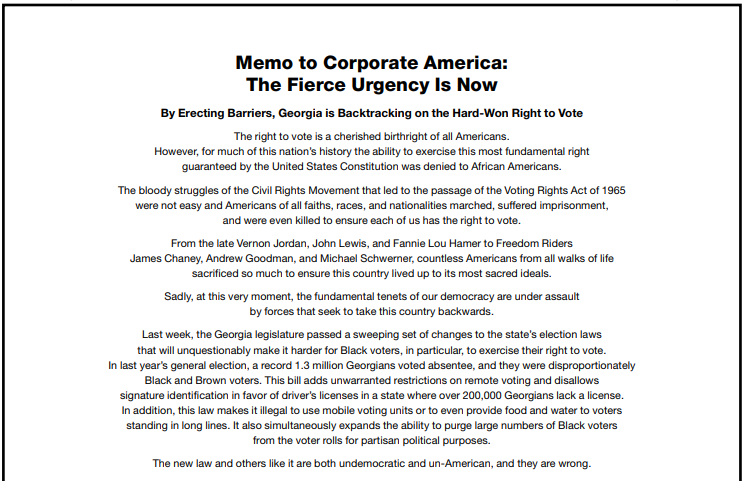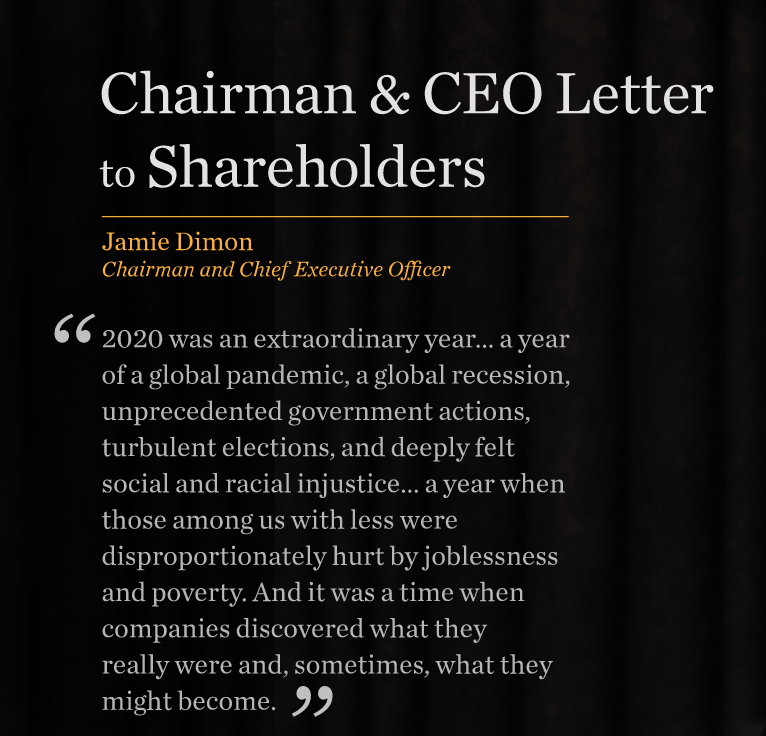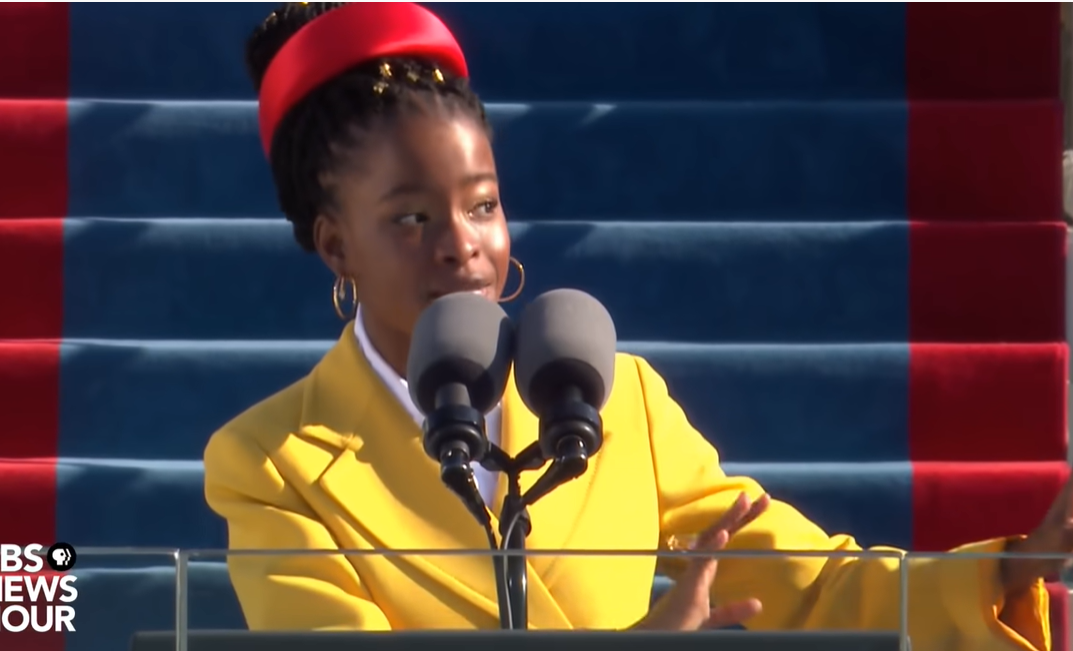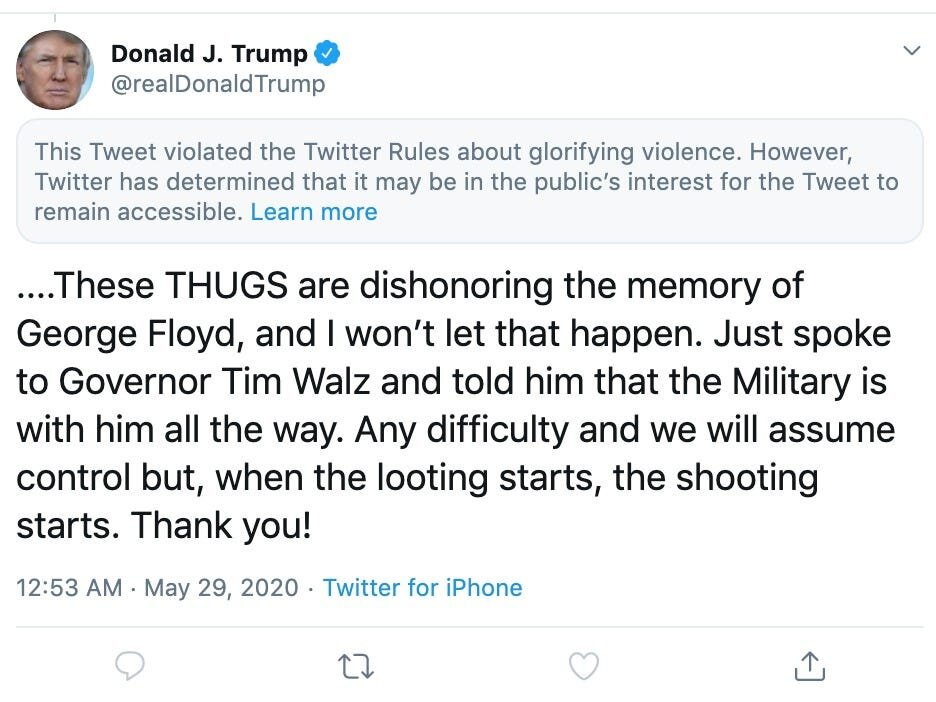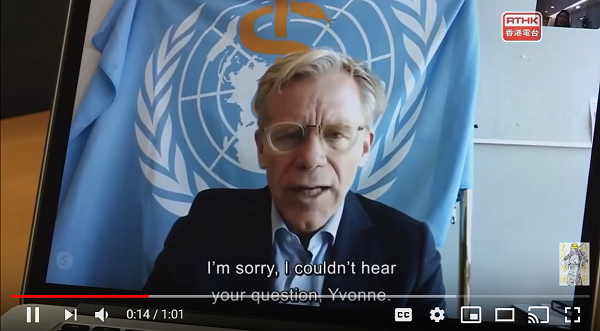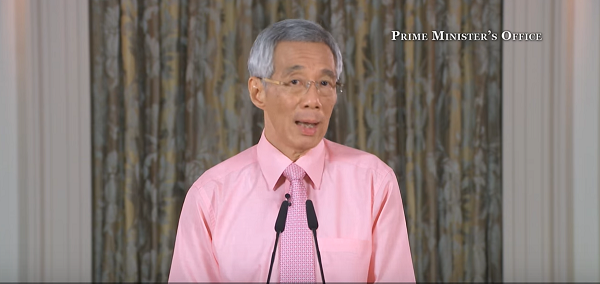Amazon’s Statement About the Failed Union Attempt
Employees at Amazon’s Bessemer, Alabama, warehouse voted against forming a union. Of 5,876 employees, 1,798 voted against and 783 for the union—not enough. The New York Times presents a simple, clear graphic of the vote.
Critics say that Amazon used aggressive tactics to deter workers from favoring the union. For example, union organizers approached employees at a traffic light, which the city changed based on a request from Amazon management. The change led to longer green lights and shorter red lights based on traffic. Before the vote, the National Labor Relations Board (NLRB) determined that two employees were fired illegally for their union-organizing activity.
In messages to employees, the company used a slogan, “Do it without dues,” meaning employees should negotiate with their managers and not through a union, which charges fees. The slogan was also the URL for a website, which has since been removed.
Amazon posted a statement about the win. The company denies intimidation charges and reinforces its $15 wage and starting benefits. Although the statement indicates that 16% of employees at the facility voted for the union, a higher percentage of those who voted were favorable towards the union.
CEOs Speak Out
JPMorgan Chase published its Annual Report, leading with a letter from CEO Jamie Dimon. The introductory paragraph and corresponding callout quote reflect a leader’s and a company’s grappling with an extraordinary year.
Like many company leaders today, Dimon addresses societal issues directly. We’re seeing increasing employee and CEO activism, and this letter is a good example.
A Wall Street Journal opinion piece questions when leaders are even more direct about political events, such as Black leaders in Georgia speaking out against the election law decision. The law restricts voting rights, which doesn’t affect the companies directly. The WSJ editorial board writes, “To wit, they are pitting themselves against the interests of their own shareholders.”
The open letter appeared as a full-page ad in The New York Times, signed by Black CEOs, former CEOs, and others of major U.S. companies.
In my view, the CEOs demonstrate leadership character, particularly authenticity, courage, and integrity. By definition, demonstrating character carries some personal risk.
Royal Family Responds to Racism Allegations
In an interview with Oprah, Prince Harry and Meghan Markle accused the British royal family of racism, and the fallout is severe. Markle talked about having suicidal thoughts and how she had been treated by the family, including plans for the couple’s baby. She said he wouldn’t have a title or security, and that the family had “concerns and conversations about how dark his skin might be when he was born.”
Prince Harry said that he a discussion with his grandmother and two with his father about the couple’s concerns until his father “stopped taking my calls.”
Victoria Murphy, a writer for Town & Country magazine, describes the family’s reaction:
So far, the royal family has remained tight-lipped. There have been no statements and, it seems, very little guidance offered. Perhaps they are retreating into a default “no comment” stance, or perhaps they are sensibly waiting to see what sticks before deciding whether to add fuel to the fire. In this war of words, there is a sense that we could go on and on.
Buckingham Palace did release a short statement, and the Queen took some time before signing off:
The whole family is saddened to learn the full extent of how challenging the last few years have been for Harry and Meghan.
The issues raised, particularly that of race, are concerning. While some recollections may vary, they are taken very seriously and will be addressed by the family privately.
Harry, Meghan and Archie will always be much loved family members.
Of course, the issue is that the royal family is a public organization, with several public figures, whether they wish to be or not.
Two days later, Prince William gave an interview and said, “We’re very much not a racist family.”
Murphy sums up the situation: “Make no mistake, this is an interview that will go down in history as having rocked the British royal family to its core.”
Rhetorical Devices and More in Amanda Gorman's Inaugural Poem
Amanda Gorman, a highly accomplished young poet, gave a riveting presentation at President Joe Biden’s inauguration ceremony. Her precise, engaging delivery—gestures, eye contact, pacing, modulation, etc.—is a lesson for communication students planning business presentations.
The poem demonstrates an extraordinary number of rhetorical devices: alliteration, assonance, anaphora, metaphors, allusions, and more. Whether or not you agree with her remarks in “The Hill We Climb,” the poem has all the marks of a speech that engages the audience and brings them along on a journey.
Twitter Announces Ban of President Trump
Two days after the riots on the U.S. Capitol, Twitter announced a “permanent suspension” of President Trump’s account after a temporary suspension.
Comparing Twitter and Facebook’s message, on January 7, about a temporary suspension, is a lesson in writing structure. Whereas Mark Zuckerberg used the indirect organizational plan, Twitter’s message states the news right up front. Zuckerberg starts with the rationale and announces the decision at the very end. Twitter starts with the decision, and then provides explanatory text, including sample tweets and the company’s assessment.
Another difference between these messages is the writer. The Twitter post is unsigned, whereas Zuckerberg signed the Facebook message himself. Additional rationale for the decision is posted on the Facebook site. Both approaches could work, and analyzing the communication is (almost) as interesting as the decisions themselves.
Random note: “Permanent suspension” sounds odd to me. A suspension is something temporary.
Company
Permanent suspension of @realDonaldTrump
By Twitter Inc.Friday, 8 January 2021
After close review of recent Tweets from the @realDonaldTrump account and the context around them — specifically how they are being received and interpreted on and off Twitter — we have permanently suspended the account due to the risk of further incitement of violence.
In the context of horrific events this week, we made it clear on Wednesday that additional violations of the Twitter Rules would potentially result in this very course of action. Our public interest framework exists to enable the public to hear from elected officials and world leaders directly. It is built on a principle that the people have a right to hold power to account in the open.
However, we made it clear going back years that these accounts are not above our rules entirely and cannot use Twitter to incite violence, among other things. We will continue to be transparent around our policies and their enforcement.
The below is a comprehensive analysis of our policy enforcement approach in this case.
Overview
On January 8, 2021, President Donald J. Trump Tweeted:
“The 75,000,000 great American Patriots who voted for me, AMERICA FIRST, and MAKE AMERICA GREAT AGAIN, will have a GIANT VOICE long into the future. They will not be disrespected or treated unfairly in any way, shape or form!!!”
Shortly thereafter, the President Tweeted:
“To all of those who have asked, I will not be going to the Inauguration on January 20th.”
Due to the ongoing tensions in the United States, and an uptick in the global conversation in regards to the people who violently stormed the Capitol on January 6, 2021, these two Tweets must be read in the context of broader events in the country and the ways in which the President’s statements can be mobilized by different audiences, including to incite violence, as well as in the context of the pattern of behavior from this account in recent weeks. After assessing the language in these Tweets against our Glorification of Violence policy, we have determined that these Tweets are in violation of the Glorification of Violence Policy and the user @realDonaldTrump should be immediately permanently suspended from the service.
Assessment
We assessed the two Tweets referenced above under our Glorification of Violence policy, which aims to prevent the glorification of violence that could inspire others to replicate violent acts and determined that they were highly likely to encourage and inspire people to replicate the criminal acts that took place at the U.S. Capitol on January 6, 2021.
This determination is based on a number of factors, including:
President Trump’s statement that he will not be attending the Inauguration is being received by a number of his supporters as further confirmation that the election was not legitimate and is seen as him disavowing his previous claim made via two Tweets (1, 2) by his Deputy Chief of Staff, Dan Scavino, that there would be an “orderly transition” on January 20th.
The second Tweet may also serve as encouragement to those potentially considering violent acts that the Inauguration would be a “safe” target, as he will not be attending.
The use of the words “American Patriots” to describe some of his supporters is also being interpreted as support for those committing violent acts at the US Capitol.
The mention of his supporters having a “GIANT VOICE long into the future” and that “They will not be disrespected or treated unfairly in any way, shape or form!!!” is being interpreted as further indication that President Trump does not plan to facilitate an “orderly transition” and instead that he plans to continue to support, empower, and shield those who believe he won the election.
Plans for future armed protests have already begun proliferating on and off-Twitter, including a proposed secondary attack on the US Capitol and state capitol buildings on January 17, 2021.
As such, our determination is that the two Tweets above are likely to inspire others to replicate the violent acts that took place on January 6, 2021, and that there are multiple indicators that they are being received and understood as encouragement to do so.
Zuckerberg's Message About President Trump's Account
Facebook has decided that President Trump will no longer use its platform for his messages—at least for a while. The decision came after riots at the U.S. Capitol and after Twitter and Facebook suspended the president’s account. The tech companies said that the president violated its rules by inciting violence and/or making false claims about the election.
YouTube blocked a video of President Trump expressing sympathy for the protestors and calling them “special.” The tech platforms had tried labeling posts, but the president’s false claims were still believed.
Some call this time an “inflection point": “Hey Mark Zuckerberg, @jack, @SusanWojcicki and @sundarpichai -- Donald Trump just incited a violent attack on American democracy. Is that FINALLY enough for you to act?!" At this point, Twitter has not yet permanently banned the president from tweeting.
Zuckerberg uses the indirect style for his post, with the main point in the very last sentence. He makes his argument first, and then we read the decision. It’s an interesting choice, which might not convey the courage that people would like to see.
Additional analysis and rationale for the decision are posted on the Facebook site.
P&G Commercials Demonstrate Empathy
Two Proctor and Gamble ads illustrate the role of empathy in understanding aspects of being Black in America. The first ad here, “The Look,” shows how a Black man experiences others’ reactions to him throughout the day. The second ad allows the viewer to watch intimate conversations that Black families have about race.
Discussion:
How would you describe the role of empathy in addressing bias?
What are the objectives of these ads? How well do they meet those objectives?
What makes these ads effective—or not—in your opinion?
Company Statements About George Floyd's Murder
Business Insider has assembled a list of companies’ statements and promised actions following the killing of George Floyd and the public protests.
TikTok, General Motors, McDonald’s—many brands are jumping into the conversation and posting messages that are both placating and inspiring.
Discussion:
Read the list of statements and actions. Which sound most meaningful to you?
Should all brands post a message? Which should, and what is important to convey?
Facebook's Position on Twitter's Labeling
Facebook CEO Mark Zuckerberg weighed in on Twitter’s decision to fact-check and label some of President Trump’s tweets. In response to protests after the death of George Floyd, one tweet promised “when the looting starts, the shooting starts.” Twitter hid the tweet with a note that it “violated the Twitter Rules about glorifying violence.”
Another tweet claimed that “mail-in voting will lead to massive fraud and abuse,” and Twitter posted a warning to “get the facts.” Until now, Twitter had not enforced its policies for the president’s tweets.
Facebook is taking a different tack. CEO Mark Zuckerberg described the company’s position:
"I believe strongly that Facebook shouldn't be the arbiter of truth of everything that people say online. I think in general, private companies shouldn't be, especially these platform companies, shouldn't be in the position of doing that."
The Wall Street Journal editorial board defended Zuckerberg’s decision: “We wish Facebook would take a lighter touch when it comes to political speech overall.”
Discussion:
What’s your view of Twitter’s actions? Why do you think the company began labeling President Trump’s tweets now?
Should Facebook follow suit? How might each company’s mission play a role in its actions?
COVID-19 Crisis Communication for Reopening the U.S.
What comes after we “flatten the curve” of COVID cases? New York Times opinion writer Charlie Warzel warns that, without a clear communication strategy for what’s next, people will distrust leaders.
Warzel cites six communication guidelines from the report of a working group at The University of Minnesota, The Center for Infectious Disease Research and Policy (CIDRP).:
Don’t Over Reassure.
Proclaim Uncertainty
Validate Emotions—Your Audience’s and Your Own
Give People Things to Do
Admit and Apologize for Errors
Share Dilemma
Discussion:
How should U.S. officials communicate now? What do they need to accomplish, and how well are our current leaders meeting the challenge? In other words, do you agree with Warzel that our leaders are falling short?
Read the entire report. What other principles does the group recommend?
Analyze the report: the audiences, objectives, writing style, organization, and so on. What are the strengths, and how could it be improved?
Airbnb Layoff Message
Airbnb Co-Founder and CEO Brian Chesky wrote to employees to announce layoffs. Ask we see more and more, the company posted the message publicly on its blog, knowing it would likely go viral anyway.
In his message, Chesky announces the decision to lay off about 25% of the workforce as part of their more targeted business strategy. Airbnb is reducing investments in some services to focus on its core business.
Although he sends a mass email, Chesky tailors the last part to different groups:
To those of you staying,
One of the most important ways we can honor those who are leaving is for them to know that their contributions mattered, and that they will always be part of Airbnb’s story. I am confident their work will live on, just like this mission will live on.
To those leaving Airbnb,
I am truly sorry. Please know this is not your fault. The world will never stop seeking the qualities and talents that you brought to Airbnb…that helped make Airbnb. I want to thank you, from the bottom of my heart, for sharing them with us.
Brian
Discussion:
What’s your view of the message? Consider the audiences and objective.
It’s quite long. Is it too long or just right?
I wish that people who were staying in their current role could get a message too. It’s unclear whether that’s planned—only that they “will not receive a calendar invite.” Your thoughts?
WHO Official Bungles Interview
World Health Organization (WHO) senior adviser Bruce Alyward wanted to avoid a reporter’s question about Taiwan becoming a member of the organization. A video of the interview shows an awkward exchange, with Alyward remaining silent (but we still see him moving and hear sounds), saying “Sorry, I couldn’t hear your question,” asking the reporter to move onto another question, and then, finally, ending the call. During a follow-up call, Alyward refers to China and then abruptly ends the call.
Taiwan has had good success in controlling COVID-19, and the government claims to have warned the WHO back in December 2019 about the contagion.
As of today, Alyward’s name is removed from WHO’s website listing advisers to the organization.
Discussion:
What is a better way for Alyward to have handled the reporter’s question?
Why do you think the WHO ignored warnings from the Taiwanese government?
Singapore PM Lee Hsien Loong
Two students sent me Singapore Prime Minister Lee Hsien Loong’s news conference as a positive example. I can see why: he gives a model speech, balancing emotional appeal and straight talk. He is proud of Singapore’s response, and yet he is honest about the challenges ahead. The PM also gives examples from other countries and the lessons learned.
Discussion:
What are the strengths of the Prime Minister’s speech?
Assess his delivery skills.
How have leaders in other countries followed this example—or how have they fell short?
Which leadership character dimensions does the PM demonstrate in his speech?
Quantifying a Tweet
When someone in an organization goes rogue and sends a tweet, what’s the potential damage? The NBA found out the hard way that the financial impact could be significant.
In October 2019, Houston Rockets General Manager Daryl Morey supported Hong Kong protests in a tweet. As a result, Chinese advertisers pulled their ads and broadcasters wouldn’t air games. Now, NBA commissioner Adam Silver admits the loss will total “hundreds of millions” of dollars and “probably less than $400 million.” Silver expanded on the damage:
“It’s substantial. I don’t want to run from that. We were taken off the air in China for a period of time, and it caused our many business partners in China to feel it was therefore inappropriate to have ongoing relationships with us. But I don’t have any sense that there’s any permanent damage to our business there.”
Discussion:
Review the situation from October. What lessons can managers learn?
What’s your view of Silver admitting the loss? What are the arguments for and against his honesty?
Letter from WeWork Employees
As WeWork plans layoffs, employees are asking for input into what happens to them and their peers. Referring to themselves as WeWorkers Coalition, the employees wrote a letter to the management team.
To the We Company Management Team:
WeWork’s company values encourage us to be “entrepreneurial, inspired, authentic, tenacious, grateful and together.” Today, we are embracing these qualities wholeheartedly as we band together to ensure the well-being of our peers.
We come from many departments across the company: building maintenance, cleaning, community, design, product, engineering and more. We believe that in the upcoming weeks we have the unique opportunity to demonstrate our true values to the world. This is a company that has inspired many of us, challenged us, and has been a formative personal and professional experience for those of us who began our careers here. WeWork has been not just a workplace, but a source of friendships and inspiration along the way.
We also believe our product can have a lasting positive impact on the world. We want to improve workplace happiness for millions of office workers and support small and medium sized businesses in their entrepreneurial efforts. We have been proud to support these goals and dedicate our time and talent to achieve them. This has been our story so far.
Recently, however, we have watched as layers are peeled back one-by-one to reveal a different story. This story is one of deception, exclusion and selfishness playing out at the company’s highest levels. This is a story that reads as a negation of all our core values. But this story is not over.
Thousands of us will be laid off in the upcoming weeks. But we want our time here to have meant something. We don’t want to be defined by the scandals, the corruption, and the greed exhibited by the company’s leadership. We want to leave behind a legacy that represents the true character and intentions of WeWork employees.
In the immediate term, we want those being laid off to be provided fair and reasonable separation terms commensurate with their contributions, including severance pay, continuation of company-paid health insurance and compensation for lost equity. We are not the Adam Neumanns of this world — we are a diverse work force with rents to pay, households to support and children to raise. Neumann departed with a $1.7 billion severance package including a yearly $46 million “consulting fee” (higher than the total compensation of all but nine public C.E.O.s in the United States in 2018). We are not asking for this level of graft. We are asking to be treated with humanity and dignity so we can continue living life while searching to make a living elsewhere. In consideration of recent news, we will also need clarity around the contracts our cleaning staff will be required to sign in order to keep their jobs, which are being outsourced to a third party. Those of us who have visas through WeWork need assistance and adequate time to find a new employer to sponsor our respective visas.
In the medium term, employees need a seat at the table so the company can address a broader range of issues. We’ve seen what can happen when leadership makes decisions while employees have no voice. We will need to see more transparency and more accountability.
We also need the thousands who maintain our buildings and directly service members to receive full benefits and fair pay, rather than earning just above minimum wage.
We need allegations of sexual misconduct and harassment to be taken seriously, acted on immediately and resolved with transparency.
We need diversity and inclusion efforts to materialize into real actions, not just talking points at company meetings.
We need salary transparency so we can surface and address systemic inequalities.
We need an end to forced arbitration contracts, which strip employees of their right to pursue fair legal action against the company.
We need all of this, and more.
In the long term, we want the employees who remain at WeWork, and those who join in the future, to inherit something positive we left behind. We want them to never find themselves in this position again, and for that to happen, they need a voice.
With this letter we are introducing ourselves, the WeWorkers Coalition. We are taking full advantage of our legal right to establish this coalition, and in doing so, we hope to give the future employees of WeWork the voice we never had.
We want to work with you. Please join us in writing a better ending to this chapter of the WeWork story.
By this Thursday at 5:00 p.m. EST, we would like to receive confirmation of your receipt of this letter and an indication of your willingness to meet us.
The WeWorkers Coalition
@weworkersco • info@weworkersco.org • #weworkers-coalition
Discussion:
What principles of business writing do the employees follow?
What persuasive strategies do they use in the letter? Find examples of logical argument, emotional appeal, and credibility.
What do you consider the strongest and weakest arguments?
What leadership character dimensions are illustrated in this situation?
LeBron James Enters the Tweet Debate
As the NBA struggles to recover after Houston Rockets General Manager Daryl Morey tweeted in support of Hong Kong protesters, LeBron James questioned Morey’s choice:
“Yes, we all do have freedom of speech. But, at times, there are ramifications for the negative that can happen when you’re not thinking about others, when you’re only thinking about yourself. . . . I believe he wasn’t educated on the situation at hand, and he spoke. And so many people could have been harmed, not only financially, but physically, emotionally, spiritually. So just be careful. . . .”
The Wall Street Journal reports that people were “stunned” by his comment because James is typically careful about his public comments.
Discussion:
What’s your view of James’ commenting on the situation? Should he have avoided commenting? Why or why not?
What’s your view of his comments? How well did he handle the situation?
What leadership character dimensions are illustrated by James’ comments?
Forever 21 Files for Bankruptcy
Retailer Forever 21 has filed for bankruptcy, and employees are not happy. In its Letter to Customers, posted on the website, the company explains the process:
This does NOT mean that we are going out of business – on the contrary, filing for bankruptcy protection is a deliberate and decisive step to put us on a successful track for the future.
Hundreds of employees are planning to unionize with United for Respect, which also represented employees from Sears and Toys R Us during their bankruptcies.
The Washington Post reports employees’ reactions to the Forever 21 decision:
[S]everal employees cited past instances where Forever 21 swiftly closed stores with little warning or explanation, which prompted their concerns over how the company would treat employees amid bankruptcy.
Unions are seeing opportunities in retail employees. Private-section union membership has been shrinking in the U.S. and is now only 6.4%, compared to 33.9% of government workers. As retail employees get discouraged by their employers, union organizing activity has been increasing.
Discussion:
Analyze the Letter to Customers. Which principles of communicating bad news are followed? How could the message be improved?
Explain the ethics of a company filing for bankruptcy. Use an ethical decision-model, such as that in Chapter 1, to determine the effects.
What’s your view of retail employees unionizing? What are the benefits to employees and potential downsides of union activity and of forming a union?
CEOs Advocate for Gun Safety
CEOs are encouraging senators to pass stricter gun regulations, such as background checks and a “Red Flag” law that allows guns to be taken from someone who poses a threat. The leaders of 145 companies sent a letter asking for the following:
“That’s why we urge the Senate to stand with the American public and take action on gun safety by passing a bill to require background checks on all gun sales and a strong Red Flag law that would allow courts to issue life-saving extreme risk protection orders.”
The Trump Administration has implemented a ban on bump stock devices, which allows a shooter to fire in more rapid succession, and President Trump has supported more thorough background checks for gun buyers.
Discussion:
What’s your view of CEOs taking on this activist role? What is driving them, and what are the potential risks?
What observations do you have about the companies that are represented—and perhaps about those that are not?
Analyze the letter by considering the audience, communication objectives, organization, writing style, and so on. What works well, and what could be improved?
British Airways Labor Dispute Arguments
On Thursday, British Airways pilots went on strike for the second time this week, grounding about 1,700 flights. Wanting a greater share of profits, pilots have turned down the company’s offer of 11.9% in pay increases over the next three years.
Typical in these situations, the union and company blamed each other. The union, the British Airlines Pilots Association (Balpa), claims that company management chose to cancel flights instead of negotiating with them in good faith:
“Balpa set a gap between the first and second periods of strike action to give BA time to work with us to settle this dispute with their pilots. We had today been exchanging new ideas to do that via [the arbitration service] Acas and so it irresponsible and inconsiderate to its customers that BA has pulled out and decided to start cancelling flights now, just to save money on compensation. BA did not respond to our latest proposals before cancelling these flights.
“Passengers who will be affected by these cancellations should know that we have given BA multiple opportunities to work with us so we could call off this action.”
The company blames pilots for walking out:
“It is now a month since we shook hands on a pay deal. We urge [Balpa] to call off their strike and return to negotiations.
“To give our customers as much certainty as possible, we are now contacting all those affected to offer them a full refund or a rebook on an alternative date, destination or airline. We are very sorry that Balpa’s actions will affect thousands more travel plans.”
Discussion:
How effectively does each side express its perspective in the above quotes?
Research both sides of this debate. What are Balpa’s strongest and weakest arguments? What are BA’s?
What persuasive strategies does each side use in its arguments: logic, emotional appeal, and credibility?
Employees Pressure Walmart to Consider Role in Gun Violence
Walmart is in a tough spot after recent shootings. Some employees are pressing the company to do more to fight gun violence, but no policy changes are planned. After previous attacks, Walmart stopped selling assault-style weapons and raised the minimum age to purchase guns and ammunition, but it’s unclear whether the leaders will do more. Employees are asking Walmart to stop selling firearms and to disallow customers from carrying guns into the stores.
The company seems divided about employees’ activism. Chief Executive Doug McMillon wrote, ”We are proud to be woven into the American fabric as a place for all people. We are more resolved than ever to foster an inclusive environment where all people are valued and welcomed.” At the same time, the company blocked two employees’ access to Slack, encouraging employees to use “more constructive ways for associates to offer feedback such as emails or conversations with leaders.”
A study recently published in the International Journal of Business Communication found that employees are more likely to “express dissent to managers and coworkers” when they are more socialized in the company and when they believe their company is “more ethical and reputable.”
A Wall Street Journal article explains the risk for Walmart to take more action against gun sales:
“[A]ny change to its gun policies risks alienating Walmart’s core customers, who often live in more conservative-leaning rural and suburban communities. The company faced some consumer backlash after raising the minimum age to purchase guns to 21.”
Discussion:
How can the company balance employees’ and customers’ perspectives? What else, if anything, should company leaders say and do?
Did the company do the right thing by blocking Slack access? In what ways are email and conversations more or less “constructive”?
What leadership character dimensions are illustrated by this situation?



